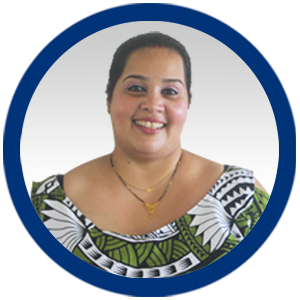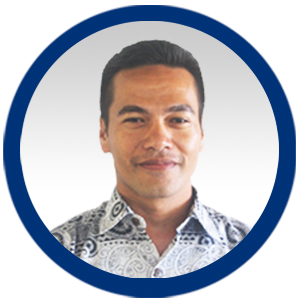PACRES USP funds PhD and Masters students at the Pacific Centre for Environment & Sustainable Development (PaCE-SD), USP, to carry out climate change research in P-ACP countries. The project further strengthens regional capacity in the Pacific by supporting the development of two new online climate action courses to be delivered through PaCE-SD, USP.
The PACRES USP component supported the development of a course on Geospatial Data Applications for Environmental Planning and Management (PC440), a mandatory course for the stream on Spatial Analysis and Planning for Islands and Oceans Stewardship (IOS). Paperwork for the course proposal is complete and ready for submission for the USP new course approval processes in 2022. Consultations began with USP’s School of Law and Social Science (SoLaSS) to identify possibilities for a new postgraduate course development or amendments to an existing course to include multilateral agreement reporting contents in the USP curricula. Further discussion on this will continue in 2022. The PACRES USP continued to support 1 Ph.D. (woman) and 4 Master (2 women and 2 men) in Climate Change students in their second year of studies. Two of the Master’s students (Mr. Rahul Prasad and Ms. Roslyn Nand) submitted their thesis for examination at the end of Semester I, 2022 pending examiners’ feedback.
 Jyoti Mala Prasad, Fiji
Jyoti Mala Prasad, FijiResearch Topic: Changing rice farmer’s perception to achieve optimal rice agronomy for enhanced food security in Fiji
Jyoti Mala Prasad is a PhD student at The University of the South Pacific (USP) through PaCE-SD under EU-Intra ACP PACRES Sponsorship on Ecosystem-based Adaptation (EbA). Her main research interest centres around Climate Change and its effects on ecosystems directory impacting on communities’ food security and livelihood.
She will be doing her research in EbA practises which is a nature-based solution that links traditional biodiversity and ecosystem conservation approaches with sustainable socio-economic development as part of an overall strategy to help local indigenous communities adapt to climate change. Her research sites in Fiji are Taveuni & Macuata and Port Vila in Vanuatu.
This research will allow to understand EbA from the perspective of Pacific Islanders and whether its practices integrate food security together with enhancing sustainable livelihoods of the local communities under a changing climate.
Jyoti holds a Master of Science in Climate Change, Post Graduate Diploma in Geography and Bachelor of Education and has about 19 years of experience in teaching of which the last 11 years has been teaching at USP Vanuatu and Fiji Campus where she has mainly taught preliminary, foundation and degree level Geography.
She is from the city of Suva in the Fiji Islands but has being brought up like a countryside girl who used to be always close to nature. This developed her love for nature. She is a mother of two boys, Ashyl and Ashvyir and wife of Shailendra Prasad. Her favourite leisure time activities are traveling, cooking, meeting people and doing nature walks.
Publication:
 Barnabas Koroa, Solomon Islands
Barnabas Koroa, Solomon IslandsResearch Topic: Integrating nature-based solutions into disaster management planning and barriers to its implementation in the Solomon Islands
My name is Barnabas Koroa from the beautiful Islands of the Solomons (Solomon Islands) also known as the happy Isles. I have a Bachelor degree in Marine Science and a Postgraduate Diploma in Climate Change and currently pursuing a Master’s degree by research in Climate Change at the University of the South Pacific.
Growing up in a small remote Island (Tikopia) community in the eastern part of Solomon Islands, I had the first-hand opportunity to observe and experienced the direct impacts of Climate Change and natural disasters on the local community, ecosystems and the environment at large. Such impacts are quite severe and realistically exerting more pressure and risks on our society, thus, require our attention. It is very upsetting as one could imagine how much our society may have already suffered and yet expecting the worst to come.
I love nature, the blue ocean, Green forests and other beautiful terrestrial settings where life is undisturbed. However, seeing these important elements of our environment being exposed to and threatened by the impacts of Climate Change day by day makes me ask myself these important questions. As part of the environment, what must I do to help alleviate these environmental risks and challenges brought forth by Climate Change? Or. How will I give back and care for the environment after all these years of enjoying the free ecosystem services it offers? Having the passion to care for the environment and our societal welfare is what motivates me to do more as an environmentalist and a Climate Change researcher. We must never forget that, one way or the other; all aspects of life are connected to the environment, therefore, each one of us has a role to play when it comes to addressing climate change impacts and other environment related issues. If we can’t beat nature, let us then work together with nature by using the likes of Nature-based Solution approaches to address our societal challenges.
Lastly, but not the least. I would like to thank the sponsor of my research which is the Intra-ACP GCCA+ PACRES as well as the USP PACRESS PaCE-SD team for your support towards my research during this pandemic. Highly appreciated (Tagio tumas).
 Rahul Ravneel Prasad, Fiji
Rahul Ravneel Prasad, FijiResearch Topic: Investigating the impacts of climate change and climatic variability on sugarcane production in the Nadogo district of Labasa
Mr. Rahul Ravneel Prasad holds a Bachelor’s degree in Agriculture Science and a Graduate Certificate in Education from Fiji National University and a Postgraduate Diploma in Climate Change from the University of the South Pacific. Mr. Prasad has 4.5 years of experience in the teaching field and also was the teacher in charge (HOD) for the Agriculture Science department at Suva Muslim College. In addition to this, he did his internship with the Ministry of Agriculture at Koronivia Research Station (chemistry lab) and Foundation for Rural Integrated Enterprises & Development (FRIEND). He has also effectively contributed to research publications in peer-reviewed scientific journals.
Publication:
 Roslyn Advina Nand, Fiji
Roslyn Advina Nand, FijiResearch Topic: Integrating Gender equity in small-scale fisheries to improve food security resilience in Fiji
I have a bachelor’s degree in Chemistry and Food Technology and a Post Graduate Certificate in Education from the University of the South Pacific. I have finished my Post Graduate Diploma in Climate Change (units completed: PC 414, PC415, PC 424, PC 426, and SC400). I have work experience of 12 years as a Science and Food & Nutrition Teacher.
I have always been passionate about Food and Nutrition Security. Fiji being an island nation and fish being one of the major food sources, made me focus on the fisheries sector and since women are known to be the food handlers and providers, it is important to empower women in improving food security, especially in preventing post-harvest losses to promote resilience from the impacts of climate change in the fisheries sector.
Climate change has been embedded in the ministry of educations curriculum for most of the subject’s content now. As a teacher, I felt, I needed to know more to deliver better. I believe the younger generation should be enlightened about the repercussions of anthropogenic activities on the environment, natural resources, animals, and humans. Simply put, climate change should be perceived as something that we as individuals should be intrigued about and take ownership of. We should not be asking what the government, NGO’s and other stakeholders can do to minimize the impacts, but rather what we can do as an individual in being sustainable and in protecting our planet.
Publication:
 Yvette Tari, Vanuatu
Yvette Tari, VanuatuResearch Topic: Community Conservation Areas (CCA) as a basis for addressing climate change and the loss of biodiversity
As an individual, I’m always passionate about the sustainability of the environment, the distribution, and the sustainability of biodiversity in a given area. My envisioned is to learn about the relationship of the local community and the resources, the intimacy between the human and the environment. Landscape and resources are what influenced communities’ livelihood. It is the environment that shapes the community’s wellbeing, however, there is a significant need for the management of these resources that communities should enthusiastic to understand and recognized the values of their surrounding and have the rational intelligence of environmental management practices. The extreme climate event has changed the landscape, its resources, and humans’ livelihood significantly. Culture and traditional practices substitution has accumulated every day. Hence, Adaptation, becoming resilience and mitigation are the front-line actions that the people are to take. Pacific islands are highly dependent on both Marine and Terrestrial resources for the day-to-day needs. However, it is showing that human accessibility to resources has out-weight the management and sustainability of these resources, which requires more focus on the environmental management approached.
My future aspiration is to engage in community activities. Advocate more on the resources distribution using the biogeography knowledge (as a science perspectives) to support community settlements understand the values of their surrounding resources within the community. Ensure to integrate this knowledge with traditional knowledge. This is to enhance capacity building in climate change adaptation and addressing the loss of biodiversity in rural/local areas and the Pacific communities.